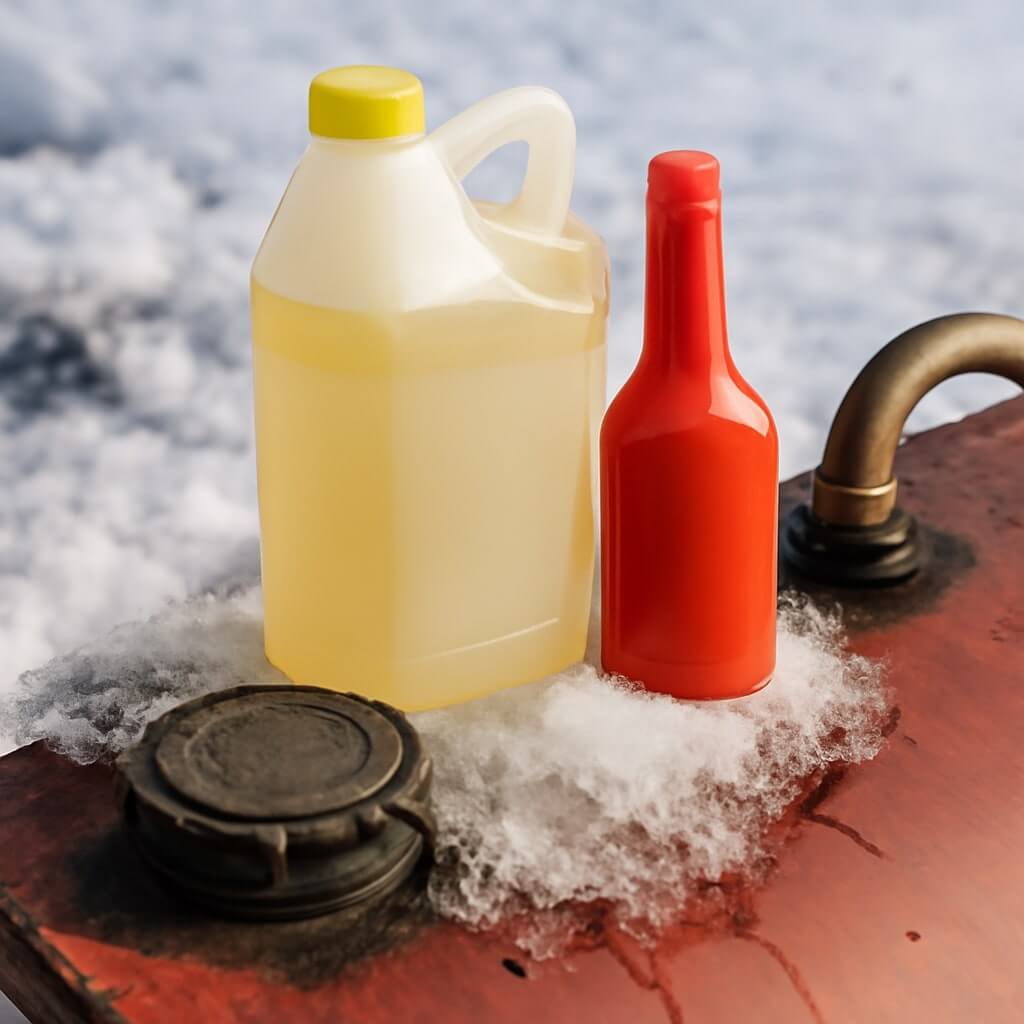When it comes to ensuring your home heating oil performs ideally in cold weather, selecting the right anti-gel additive is essential. These additives can prevent gel formation that leads to heating disruptions. You’ll want to understand how they work, the key ingredients to look for, and which products stand out in the market. Let’s explore the top choices available and the benefits they offer for your heating system.
Key Takeaways
- Howes Diesel Treat is highly regarded for improving fuel stability and preventing gel formation in heating oil.
- Power Service Diesel Fuel Supplement effectively lowers pour points, enhancing winter performance.
- Look for additives with polyether amines for superior cold flow properties in heating oil.
- Ensure the selected additives contain anti-oxidants and detergents for maintaining fuel quality and cleanliness.
- Apply additives before cold months, following recommended dosages of 1 to 2 ounces per gallon for optimal results.
Understanding Heating Oil Gelation
Heating oil gelation occurs when low temperatures cause the waxes in heating oil to solidify, leading to clogs in fuel lines and filters.
The properties of heating oil, particularly its wax content, play a significant role in gelation. As temperatures drop, the waxes precipitate out, creating a gel-like substance that obstructs flow.
Gelation causes can also be influenced by the specific formulation of the heating oil, including the ratio of paraffin to aromatic compounds.
Understanding these factors helps you prevent issues during cold weather, ensuring your heating system operates efficiently and effectively when you need it most.
How Anti-Gel Additives Work
Anti-gel additives enhance cold weather performance by lowering the pour point of heating oil, ensuring it remains fluid in frigid temperatures.
They work by inhibiting the formation of wax crystals, which can lead to fuel blockages in your system.
Cold Weather Performance
When temperatures drop, fuel oil can thicken and form gel-like substances, which can clog filters and disrupt your heating system.
Anti-gel additives work by modifying fuel viscosity, allowing it to flow more freely even in extreme cold. These additives lower the temperature thresholds at which wax crystals form, preventing them from coalescing into gel.
By improving the cold-weather performance of your heating oil, they guarantee consistent fuel delivery and efficient combustion.
When choosing an additive, consider its effectiveness at your specific temperature range to maintain ideal heating system operation during winter months.
Preventing Fuel Blockages
Cold weather performance is directly tied to the risk of fuel blockages in your heating system.
Anti-gel additives work by lowering the pour point of your heating oil, ensuring that it remains fluid even in frigid temperatures. By preventing wax crystals from forming, these additives keep your fuel line clear and functional.
Regular winter maintenance, including the application of anti-gel additives, is essential to avoid costly disruptions. When you add these additives, you enhance the reliability of your heating system, ensuring it operates smoothly despite the cold.
Don’t let winter weather catch you off guard—take proactive steps today!
Key Ingredients to Look For
Choosing the right anti-gel additive for home heating oil requires understanding the key ingredients that enhance performance in low temperatures.
Look for essential compounds like pour point depressants, which lower the temperature at which wax crystals form, and anti-oxidants that prevent fuel degradation.
Additionally, consider detergents that help keep your fuel system clean and functioning properly. Some additives contain viscosity modifiers to maintain oil flow, while others include stabilizers that prolong shelf life.
Top Anti-Gel Additives Reviewed
As winter approaches, selecting the right anti-gel additive becomes essential for guaranteeing your home heating oil performs effectively in frigid conditions.
Among the top products, you’ll find innovations that reflect current industry trends. For instance, additives like Howes Diesel Treat and Power Service Diesel Fuel Supplement are designed to lower the pour point and enhance fuel stability.
Innovative additives like Howes Diesel Treat and Power Service enhance fuel stability and lower pour points for optimal winter performance.
Additionally, products containing polyether amines offer superior cold flow properties.
When choosing an additive, consider those that combine efficiency with environmental safety.
Staying informed about product innovations guarantees you make a wise choice to protect your heating system this winter.
Benefits of Using Anti-Gel Additives
Using anti-gel additives can greatly enhance the performance of your home heating oil during winter months, ensuring reliable heating when you need it most.
These additives prevent fuel gelling, allowing your system to run smoothly even in extreme temperatures. By improving flow and combustion efficiency, they can reduce emissions, positively affecting the environmental impact.
User experiences often highlight fewer heating disruptions and enhanced system reliability, leading to peace of mind. Additionally, using anti-gel additives may prolong the life of your heating system, minimizing maintenance costs.
Application Tips for Optimal Results
To achieve ideal results with anti-gel additives, you need to follow proper dosage guidelines closely.
Timing your application is essential, as adding the product at the right moment can enhance its effectiveness.
Additionally, paying attention to storage conditions will help maintain the integrity of the additive, ensuring it performs as intended.
Proper Dosage Guidelines
When applying anti-gel additives to home heating oil, it’s crucial to follow proper dosage guidelines for maximum effectiveness.
Start by using proper measurement techniques to guarantee accurate dosing. Typically, the recommended concentrations range from 1 to 2 ounces of additive per gallon of heating oil, but always check the manufacturer’s instructions for specific recommendations.
For best results, measure carefully and avoid over-dosing, as excess additive can lead to reduced performance.
Remember, maintaining the right balance helps prevent gelling while making sure your heating system operates efficiently throughout cold weather conditions.
Always store additives in a cool, dry place to maintain their effectiveness.
Timing of Application
Although you can apply anti-gel additives at any time, timing plays an essential role in maximizing their effectiveness.
To guarantee peak performance, consider seasonal considerations; apply additives before the coldest months to prevent gel formation. Regular application frequency is important, especially during extended cold spells.
Generally, a preemptive approach works best, so add the anti-gel to your heating oil tank when temperatures are forecasted to drop considerably. If you notice any signs of gelling, reapply immediately.
Storage Conditions Importance
Proper storage conditions are essential for maintaining the effectiveness of anti-gel additives in home heating oil.
Make sure you store your fuel at ideal storage temperatures, ideally between 40°F and 70°F, to preserve its quality. Extreme temperatures can compromise the fuel quality and the additive’s performance, leading to gel formation in colder conditions.
Keep your storage tank clean and free from contaminants, as they can adversely affect both the fuel and additives.
Regularly monitor the storage environment to maintain consistency, making certain your anti-gel additives work effectively when you need them most.
Prioritizing these conditions will enhance your heating oil’s performance.
Comparing Costs and Effectiveness
While selecting the right anti-gel additive for home heating oil, it’s essential to weigh both costs and effectiveness. A cost comparison helps you make informed decisions, while an effectiveness analysis guarantees peak performance.
Selecting the right anti-gel additive requires careful consideration of both cost and effectiveness for optimal heating performance.
Here are key factors to take into account:
- Price per gallon: Compare different brands to find budget-friendly options.
- Dosage requirements: Assess how much additive is needed per tank.
- Temperature protection: Evaluate how low temperatures each product can handle.
- User reviews: Check feedback on effectiveness to gauge real-world performance.
Balancing these aspects guarantees you choose the best additive for your heating needs.
Conclusion
In summary, using anti-gel additives for home heating oil is crucial for maintaining peak performance during cold weather. By selecting products like Howes Diesel Treat or Power Service Diesel Fuel Supplement, you can effectively prevent gel formation and guarantee a steady flow of heating oil. Remember to follow dosage guidelines for the best results. With the right additive, you’ll enhance fuel stability, protect your heating system, and enjoy consistent warmth throughout the winter months.




